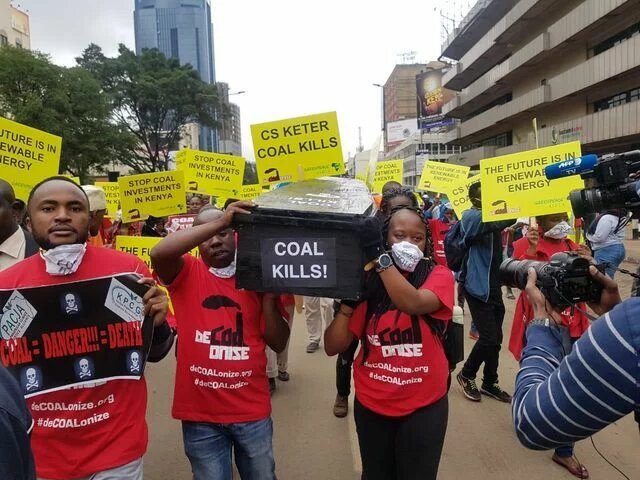
The National Environment Tribunal (NET) has cancelled the license issued by the National Environment Management Authority (NEMA) to Amu Power for the construction of the Lamu Coal Power Plant finding that a proper environment impact assessment study was not carried out.
In a ruling delivered on Wednesday, June 26, 2019 at the Supreme Court of Kenya, NET ordered Amu Power to undertake a new Environmental and Social Impact Assessment (ESIA) for the project. In the interim, no construction is permitted to begin on the Lamu coal plant. A valid ESIA license is required for the project to proceed and for contracts to take effect. Among the ESIA’s significant insufficiencies, the tribunal members faulted Amu Power for their failure to conduct effective public participation. Reading the judgment, Chairman Mohamed Balala noted that the tribunal could not excuse non-compliance. “Public participation is the oxygen that gives life to an ESIA report”, said Chairman Balala.
This judgment has affirmed Kenya’s position as a global leader in renewable energy and has firmly put the country on its path to transition to 100% Renewable Energy by 2020, as President Uhuru Kenyatta has pledged. Currently, Renewable Energy makes up 70% of the country’s installed electric power capacity. The Judgment marks the close of an appeal which commenced before NET in October 2016 and which has since its filing, halted the development of the Lamu Coal Plant.
Case Background
In 2016, Katiba Institute filed an appeal No.196 of 2016 on behalf of Save Lamu and Partners listing NEMA and Amu Power as respondents. The Appeal was filed on the following grounds, which violate ESIA license requirements:
- Erroneous approval of the ESIA report: The Environmental Impact Assessment study (ESIA study) conducted by Amu Power contains a poor analysis of the alternatives and economic justification for the coal plant.
- Lack of public participation: The ESIA study process lacked proper and effective public participation.
- Effects on marine environment: The coal plant will cause marine pollution through the discharge of thermal effluent in the marine environment, with adverse environmental impacts on the unique mangrove and sea grass ecosystems.
- Violation of land laws: The location of the project contravenes land allocation requirements as set out in public land laws. Public land that falls within mangroves, wetlands, riparian areas, the territorial sea, is along beaches or falls within environmentally sensitive areas should not be allocated for development under our land laws.
- Negative impacts on Kenya’s air quality and on climate change: The project will certainly have a negative impact on Kenya’s air quality due to the emission of hazardous air pollutants that could lead to adverse health impacts. The coal plant will contribute to adverse climate change with projected greenhouse gas (GHG) emissions as high as 8.8 million tons of CO2eq per year, in violation of Kenya’s commitment to abate GHG emissions by 30% by 2030.
- Coal dust pollution: The coal plant fails to provide any mitigation measures to curb coal dust pollution during handling and storage of the coal, which is to be imported from South Africa through the proposed Lamu Port and potentially from future coal mines in Kitui County, Kenya.
- Lack of sound mitigation measures: The coal plant does not have sound and effective mitigation measures, to prevent environmental and social harms, that must be adhered to in the construction and operation of the project.
- Economics - unviability of project: The coal plant is not economically viable, and the cost of electricity from Lamu coal plant will be higher than alternatives. In the ESIA, the project costs were not examined in their entirety, in light of compounding factors: Significant additional infrastructure would be needed for the plant, including a transmission line, access roads, port berth and potentially, railway. The real cost of imported coal from South Africa is double what is calculated by Amu Power. Also, the coal plant is likely to be operated at very low capacity levels, based on projected energy demand in Kenya.
We congratulate our partners, including Natural Justice, deCOALonize and Save Lamu, for spearheading the continued anti-coal mobilization and advocacy efforts, to oppose the proposed coal plants in Kenya.